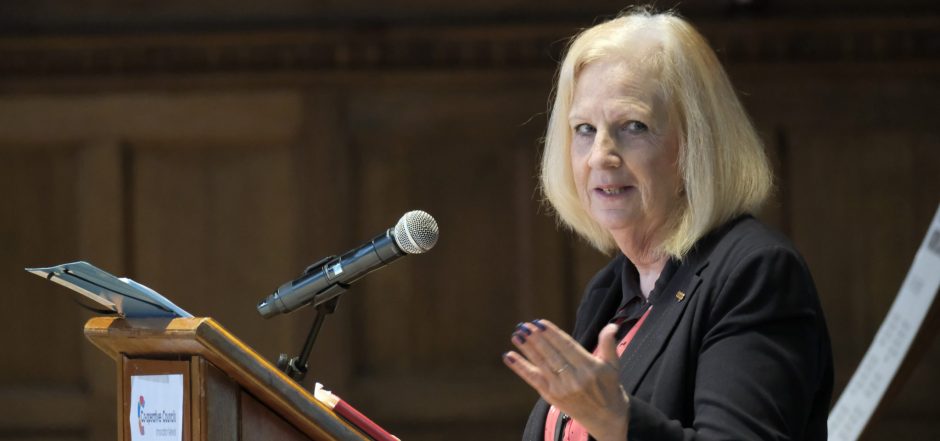Chancellor Rishi Sunak unveiled his first budget statement yesterday, making gloomy predictions about the economy.
Mr Sunak said the the Office for Budget Responsibility expected the economy to contract by 11.3% this year, the biggest decline in three centuries, and it would take until the end of 2022 to return to its pre-pandemic size.
In response to the crisis, he unveiled a series of measures including a £500m hardship fund for councils in England to help vulnerable residents, and an offer of business interruption loans of up to £1.2m for small firms.
Other measures include a £3,000 cash grant for firms eligible for small business rates relief, a plastic packaging tax which comes into force by 2022, £600bn to be spent on roads, rail, broadband and housing by the middle of 2025.
But responding for the opposition, shadow chancellor – and Labour/Co-op MP – Anneliese Dodds said Mr Sunak had left “many of the big decisions put off until later”.

She said local authorities, self-employed workers and SMEs needed more support, adding: “Now we must be ambitious for the future of our country’s economy. Our ambition should not just be to build our way out of this but to do so in a greener and cleaner way.
“The Conservatives are still refusing to impose conditions on investment – to ensure that it contributes to the goal of net zero, that it supports local jobs, uses local firms, leads to sustainable skilled employment in local areas and prevents the use of tax havens and other asset-stripping.”
Related: Can community wealth building solve the crises of Covid and climate?
Ms Dodds’ response follows the Co-op Party’s local government conference last weekend, where she launched a new partnership between the Party and the shadow Treasury team to understand the impact of Covid-19 on the co-operative sector, and to look at how the co-operative movement and its values can help shape the UK’s economic recovery.
Over the next six months, the Co-operative Recovery Partnership will help develop ideas for “a country that works for everyone”, drawing on ideas from co-op support groups, community organisations and the Co-operative Councils Innovation Network (CCIN), which has been putting co-operative ideas such as community wealth building to improve service delivery after a decade of austerity.
Cllr Sharon Taylor – leader of Labour’s Stevenage Council and chair of the CCIN – said in her response to the budget: “Our co-operative councils have worked exceptionally hard to support their residents and communities throughout the pandemic.
“Our direct contact with our communities through our regular engagement means we have been extremely resilient and the outcome of that has been published in our Covid-19 Case Studies booklet.

“But funding for us, as with councils everywhere, continues to be an extreme concern. This would have been the case even without the Covid pandemic but that has put the local government funding crisis into an even sharper focus as our costs have rocketed and our income has fallen drastically.
Related: Co-ops respond to uncertainty over Brexit process
“The government has provided some funding to meet the costs, but there is no doubt that their promise to local government at the start of the crisis that we were to do everything needed to support our communities and they would provide the funding to do so, has not been kept. The Local Government Association estimates there is still a £5.8bn funding gap and the issues around funding of social care cannot be resolved by the government’s proposal of a further 3% social care precept this year.
“Council tax rises will prove difficult for many residents whose household income has already been hit by job losses or reduced hours and council tax increases can further worsen existing inequalities as poorer areas benefit less from them than those with strong economies. Our councils want to support their communities through to the recovery as they have done during the pandemic. We need proper, sustainable funding to do so.”
James Wright, policy officer at Co-operatives UK, said: “The degree to which new funding for communities and business support announced yesterday ends up boosting co-op development, largely depends on how much freedom local leaders and communities will have to direct resources that way. And that’s not been clarified.

“The £4bn Levelling Up Fund could provide fresh opportunities for co-ops in areas like community infrastructure and arts and culture. But a lot depends on who in local areas will actually be bidding for this money. Who will have the agency and power here? We also need to find out whether the fund can be combined with things like Community Shares.
“The outline of the UK Shared Prosperity Fund (UKSPF) that’s been provided leaves some critical questions unanswered. Again, who will control these funds locally? And how much freedom will local leaders and communities have to use the UKSPF for things like co-op development?
“One potentially very positive change in the UKSPF from EU structural funds, is a much clearer focus on investment in communities, including specifically community-owned assets. Here the UKSPF should combine with community shares.
“There’s more money for business support and employment support. But again it’s not clear how much local leaders who want to boost co-op development, will be empowered to use direct resources in that way.”
Environmental pledges in Mr Sunak’s statement include a £640m ‘nature for climate fund’ to protect natural habitats in England, and a charge of £200 a tonne for manufacturers and importers whose products have less than 30% recyclable material.
But Community Energy England said the chancellor had missed an opportunity to help the environment by supporting community-owned renewables.
“He omitted to extend to any enabling support for brilliant community energy groups which stand ready to mobilise thousands of passionate, knowledgeable local people and millions in investment in local solutions for the vital energy transition to zero-carbon,” said CEE.
“This is dangerously short-sighted as it is also ‘planning to fail’ in the huge challenge to achieve zero-carbon. The Committee on Climate Change Net Zero report was clear: ‘It will not be possible to get close to meeting a net-zero target without engaging with people or by pursuing an approach that focuses only on supply-side changes’, an approach that pretty well sums up the Spending Review with hundreds of millions for nuclear and hydrogen and a billion for carbon capture and storage.
“Community energy is essential to engaging the consent and active participation of people and communities in the huge changes required. Yet it has been increasingly disabled by policy changes since 2015 such that it is now nearly impossible to make an investment case to do community energy projects of any kind.”
It added: “A few million committed to reinstating the Urban Community Energy Fund, for instance, would have lifted urban community energy over a low threshold into viability and enabled communities to raise many more millions for local energy projects, including essential demand reduction and fuel poverty work, bringing huge social and environmental returns on investment.
“If the decision not to fund community energy was based on the new improved Treasury Green Book supposedly factoring in social value and net zero, then the update has failed.”
Colin Baines, of the Friends Provident Foundation, said: “We welcome the National Infrastructure Bank located in the north of England. It must have a net-zero rule and be able to fund community assets including community energy.
“The chancellor barely mentioned the climate or renewable energy in his statement. And Net Zero was not one of the three priorities. We can have no confidence that this will be enough to set us back on track to meet net-zero, even by 2050, and show the world leading ambition needed of the COP26 president.
“We welcome the commitment to extra off-shore and on-shore wind and solar but this effectively excludes community energy projects as support is only available for projects larger than 5 megawatts.”